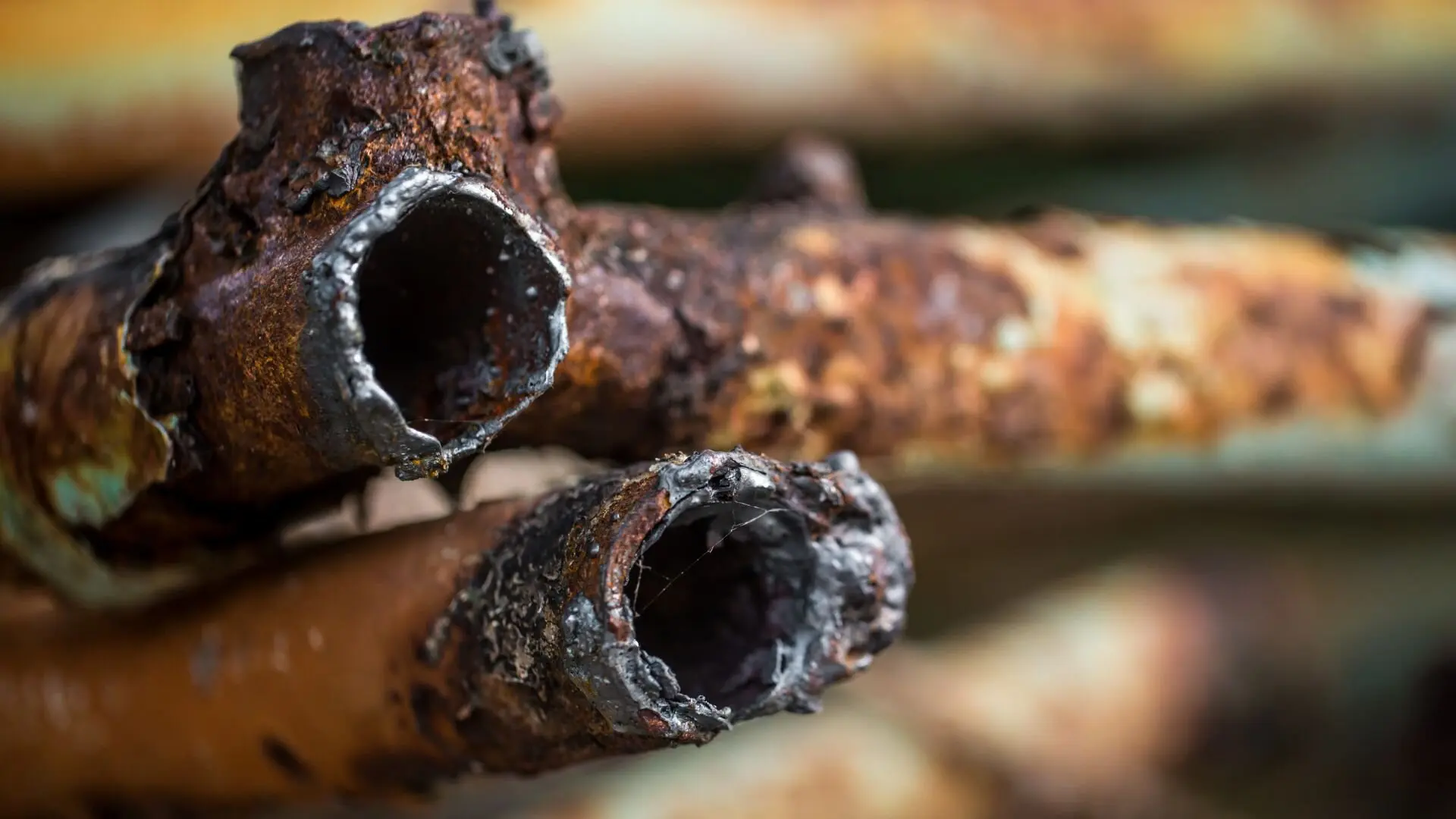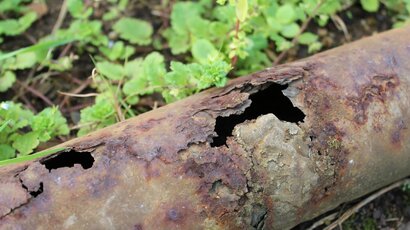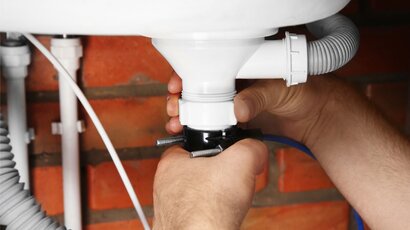Corrosion, if ignored, can wreak havoc on your plumbing system. It often results in rust, scale build-up, leaks, and even contamination issues in your water supply.
Metal pipes, especially galvanised steel, are particularly susceptible to corrosion over time. Utilising corrosion inhibitors and other preventive measures proactively is crucial to sidestepping expensive repairs.
This guide offers homeowners and property managers a comprehensive overview of pipe corrosion, detailing its effects and practical ways to spot and prevent these issues. Get ready to learn how to safeguard your plumbing system from corrosion!
Understanding Corrosion in Plumbing Systems
Corrosion is the gradual deterioration of metal pipes, copper piping, and other plumbing components. As water moves through the pipes, chemical reactions occur, leaving mineral deposits and rust behind. Over time, the protective layer is destroyed.
Elements such as water chemistry, flow velocity, temperature, and dissolved oxygen can hasten galvanic corrosion. This often results in leaks, blockages, compromised water quality, and structural weaknesses.
![]()
Impacts of Corrosion on Water Supply and Plumbing
Corrosion in pipes affects household and commercial water supplies in various ways:
Materials like galvanised steel, copper pipes, and iron are prone to corrosion damage over time. Even concealed pipes inside walls and foundations will eventually be weakened. Catching corrosion early is critical to avoid total component failure.
Strategies for Preventing Plumbing Corrosion
![]()
Being proactive with pipe maintenance and implementing corrosion prevention methods when installing or upgrading plumbing systems is key:
- Use corrosion-resistant materials like PEX or PVC rather than galvanised steel or cast iron.
- Consider copper pipes and stainless steel for some applications as they resist corrosion.
- Install insulating joints and couplings when transitioning between dissimilar metals to prevent galvanic corrosion.
- Maintain optimal 40-80 PSI water pressure. High pressure accelerates corrosion over time.
- Keep water pH between 6.5-8. Acidic water under 6 corrodes pipes faster.
- Use water treatment and corrosion inhibitors to influence water chemistry.
- Ensure microbiological contaminants don’t grow and form biofilm layers.
- Replace outdated, corrosion-prone pipes like lead service lines and galvanised steel.
Preventing Specific Plumbing Corrosion Challenges
Certain plumbing systems, water sources, and installations require specialised corrosion prevention strategies. Dissolved oxygen in the water promotes corrosion by reacting with metal components. Using deaerators and airtight plumbing systems helps remove oxygen before it can accelerate pipe deterioration.
![]()
In hard water areas, water softeners help reduce scale build-up and corrosion damage by replacing stiff mineral ions like calcium and magnesium with sodium ions. Pre-installation cleaning and maintenance measures that prevent contact between dissimilar metals will also avoid accelerated galvanic corrosion.
Finally, microbiological contaminants like corrosive bacteria should be controlled through chlorine injection or other disinfection methods to inhibit microbial-influenced corrosion.
Protecting Health and Safety from Corrosion
Even minor corrosion can allow chemical contaminants like lead and copper to infiltrate water systems, causing health problems. Corroded pipes must be addressed swiftly to avoid compromising drinking water safety. Ongoing corrosion prevention is crucial to keep water safe.
Implementing an Effective Corrosion Prevention Plan
A robust corrosion prevention plan starts with selecting the right materials resistant to corrosion during the design or re-pipe phase. Copper, flexible plastic piping like PEX, and stainless steel alloys are less corrosion-resistant than galvanised steel or iron. Any metal components should have protective coatings or linings applied, whether epoxy, enamel, or insulating joint sleeves.
It’s also essential to monitor and control water chemistry. Test pH regularly and aim for a 6.5-8.0 range using acid neutralisers or alkali injectors. Chlorination or other disinfection limits microbially-influenced corrosion.
Particulate filters remove sand and dirt that could abrade pipe walls. Water softeners reduce the hardness of minerals that react with metal. If necessary, other chemicals like phosphates, silicates, or zinc compounds can be dosed as corrosion inhibitors for problematic water supplies.
![]()
Vigilant maintenance is also required in addition to chemistry. Conduct regular professional inspections to identify potential corrosion and address minor issues like leaks before major repairs are needed. Airtight plumbing with deaerators limits water oxygenation. Keep aerators and strainers clear of debris. Prompt identification and remediation of corrosion will limit damage and costs.
A dedicated water treatment system overseen by corrosion control specialists is advisable for large facilities. But smaller systems can also benefit from these fundamental approaches - selecting resistant materials, facilitating proper water chemistry, following manufacturer specifications, and inspecting and maintaining plumbing components.
Preventing corrosion takes vigilance but pays dividends by averting pipe damage, water loss, and costly repairs down the road.
Prevent Pipe Damage and Costly Repairs
Corrosion prevention involves vigilance, early detection, and proactive maintenance. However, ignoring corrosion threats can lead to ruptured pipes, rusty water, contamination, and costly plumbing repairs.
Don’t wait until major issues arise. Monitor your plumbing system closely and address even minor leaks or anomalies immediately. The most effective approach is to implement the right materials, water treatment, and maintenance routines before corrosion takes hold.
Contact the licensed professionals at WP Plumbing in Melbourne for assistance creating a customised corrosion prevention plan for your residential or commercial plumbing system.
Our experienced plumbers can inspect your existing pipes, recommend corrosion-resistant materials for re-piping, install protective linings and coatings, and implement water treatment to control pH and chemistry. We also provide ongoing corrosion monitoring services to identify issues early before they escalate.
Don’t leave your plumbing system’s longevity and water quality to chance—partner with WP Plumbing in Melbourne for proven corrosion prevention that protects your pipes and gives you peace of mind.
Preventing Corrosion In Your Plumbing System FAQs
How can I prevent microbiological contamination and corrosion in my household water lines?
Prevent microbiologically influenced corrosion by treating your water system with chlorine or other chemical disinfectants to keep bacterial growth in check. Also, regularly flush infrequently used pipes and promptly repair leaks to prevent microbial intrusion.
What is the best corrosion inhibitor for pitting corrosion in my water pipes?
For aggressive water that causes pitting corrosion, phosphate or silicate inhibitors work well to protect metal pipes. Maintaining water pH between 6.5 and 8.0 also helps minimise chemical reactions that cause pitting damage.
How can I stop blue or green stains caused by copper corrosion in my bathroom?
Blue or green stains are signs of copper corrosion. To prevent this chemical reaction, ensure your water system maintains optimal pH and hardness levels. You can also install copper corrosion inhibitors, like zinc or phosphate compounds, to form a protective layer on pipes.







